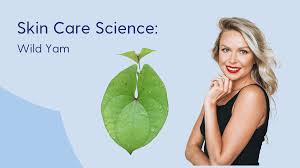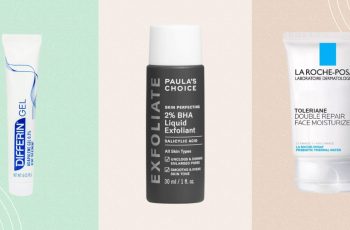
The Science of Wild Yam in Skin Care
Wild yam is touted as a beneficial anti-aging skin care ingredient by many influencers who focus on natural and plant-derived ingredients. While scientific studies on the effectiveness of wild yam in skin care as an anti-aging product are limited, there is some evidence that its anti-inflammatory and purported estrogenic effects may help to make the skin look and feel younger, particularly in perimenopausal or menopausal women. However, because of those estrogenic properties, wild yam cream may not be suitable for everyone.
Before diving into the ins and outs of what wild yam is and how it might be able to help your skin, make sure you know your skin type to better determine if this ingredient could be worth a try.
Wild yam in skin care may improve wrinkles and dryness caused by decreased estrogen.
There is limited scientific evidence on the cosmetic effects of wild yam in skin care.
Women with a history of breast or ovarian cancers should check with their doctors before using wild yam cream.
Eating wild yam may increase estradiol and estrogen levels, but topical wild yam probably does not.
What Is Wild Yam (Dioscorea villosa)?
Wild yam, scientifically known as Dioscorea villosa, is a perennial vine native to North America. Traditionally, it has been used in herbal medicine for centuries, particularly among Native American tribes. The plant is characterized by its heart-shaped leaves and tuberous roots, which contain various bioactive compounds.
The root of the plant is commonly harvested and processed into extracts, creams, and capsules and used not only in skin care but as a natural remedy for symptoms of menopause. Again, studies are limited on its potential to effectively improve menopausal symptoms, although at least one study has found that short-term use of wild yam for this purpose may be free of adverse side effects (3).
Estrogenic Effects
Wild yam is often associated with an ability to influence hormone levels in the body, especially estrogen. Natural estrogen levels begin to steeply decline as women go through menopause, which can cause the skin to become dry and wrinkles more noticeable. This is because estrogen plays a key role in the production of collagen, a crucial protein needed for firm, youthful-looking skin.
Wild yam contains compounds called phytoestrogens that can mimic the function of estrogen in the body. This is why it is often included in skin care products designed for women in menopause. However, there is not a lot of data to support this.
Wild yam does not contain actual estrogen. It has phytoestrogens that can bind to estrogen receptors. This may allow topical wild yam in skin care products to improve symptoms like dry skin and wrinkles that are associated with decreased estrogen levels.
However, studies (3) have shown that topical creams containing wild yam did not improve menopausal symptoms. Eating wild yam, conversely, did affect hormone levels such as estrone (5).
Active Compounds in Wild Yam
Wild yam contains a number of active compounds that may also be beneficial to the skin when used topically:
Diosgenin. Diosgenin is a steroidal saponin that serves as a precursor to various hormones, including progesterone. In the context of skin care, diosgenin is believed to support skin health through its anti-inflammatory and antioxidant effects.
Saponins. Saponins in wild yam are thought to contribute to its anti-inflammatory properties by regulating inflammatory pathways and therefore soothing irritated or inflamed skin. Additionally, saponins are known for their ability to enhance the penetration of other active ingredients into the skin.
Flavonoids. Wild yam contains a variety of flavonoids, a class of polyphenolic compounds with strong antioxidant properties. Flavonoids help to protect the skin from oxidative stress by neutralizing free radicals and therefore reducing or preventing damage to skin cells that they can otherwise cause.
Starches and dietary fiber. While not directly active in the same way as saponins or flavonoids, the starch and fiber content in wild yam may help to improve skin hydration by forming a protective barrier that retains moisture. This can enhance skin smoothness and elasticity when included in topical formulations.
Benefits of Wild Yam in Skin Care
The many active compounds found in wild yam may impart several benefits on the skin, including:
Anti-aging effects. The estrogenic effects of wild yam may help to improve signs of aging such as dryness, wrinkles, or thinning skin caused by declining estrogen levels in women. Additionally, antioxidant properties of wild yam help to reduce signs of skin aging caused by free radical damage.
Enhanced hydration. The starch and fiber content in wild yam can form a protective barrier on the skin’s surface, helping to lock in moisture. Additionally, saponins found in wild yam may enhance the absorption of other hydrating ingredients, improving the skin’s overall moisture levels and elasticity.
Soothing properties. Due to its anti-inflammatory properties, wild yam can soothe irritated or inflamed skin, making it suitable for sensitive skin types.
Side Effects of Wild Yam in Skin Care
Wild yam cream may come with a few notable side effects to be aware of, including:
Hormonal imbalances. Wild yam contains diosgenin, a compound that can mimic estrogen in the body. Overuse may disrupt natural hormone levels, so check with your doctor before using, especially if you have a history of hormonal imbalances.
Allergic reactions. Some people may experience skin irritation, redness, or allergic reactions when using wild yam cream.
Digestive issues. Though rare with topical application, if ingested, wild yam can cause nausea, vomiting, or digestive discomfort.
Wild Yam and Cancer Risk: What Does the Research Say?
There is ongoing debate about whether wild yam influences cancer risk, particularly hormone-sensitive cancers like breast and ovarian cancer. The concern comes from wild yam’s potential estrogenic effects, as elevated estrogen levels have been linked to an increased risk of these cancers.
However, scientific research on wild yam and its direct impact on cancer risk is limited and inconclusive. Most studies focus on diosgenin, the compound in wild yam that resembles estrogen, though it doesn’t necessarily function the same way in the body. Current evidence does not definitively support the idea that wild yam cream significantly raises cancer risk, but it also doesn’t fully dismiss the possibility, particularly in women with a history of breast or ovarian cancers.
Given the lack of concrete evidence, those with a history of breast cancer, ovarian cancer, or other hormone-related conditions should consult with their doctor before using wild yam products.
Who Should Avid Using Wild Yam?
Although topical wild yam in skin care is probably not strong enough to have a systemic hormonal effect, it is best for people with the following characteristics and conditions to avoid wild yam in the diet and in skincare:
Women with a history of estrogen responsive cancers such as breast and uterine cancer
Boys and men
Pregnant woman
Melasma or hyperpigmentation
Products That Contain Wild Yam
There are many creams available that contain wild yam. One leading brand is Neocutis, which includes wild yam extract in a variety of its anti-aging moisturizing products.
Bottom Line: Does Wild Yam in Skin Care Actually Work?
The effectiveness of wild yam in skin care largely depends on your individual skin type specific concerns. While many people report positive results from using wild yam products, scientific evidence regarding its estrogenic effects and overall benefits is still emerging.
Wild yam’s active compounds may offer some benefits, particularly for those looking to address dryness, irritation, and signs of aging. However, people with specific health concerns or hormonal imbalances should consult with their doctor before starting a wild yam regimen. Men should avoid using products and ingesting foods with a high concentration of wild yam.


